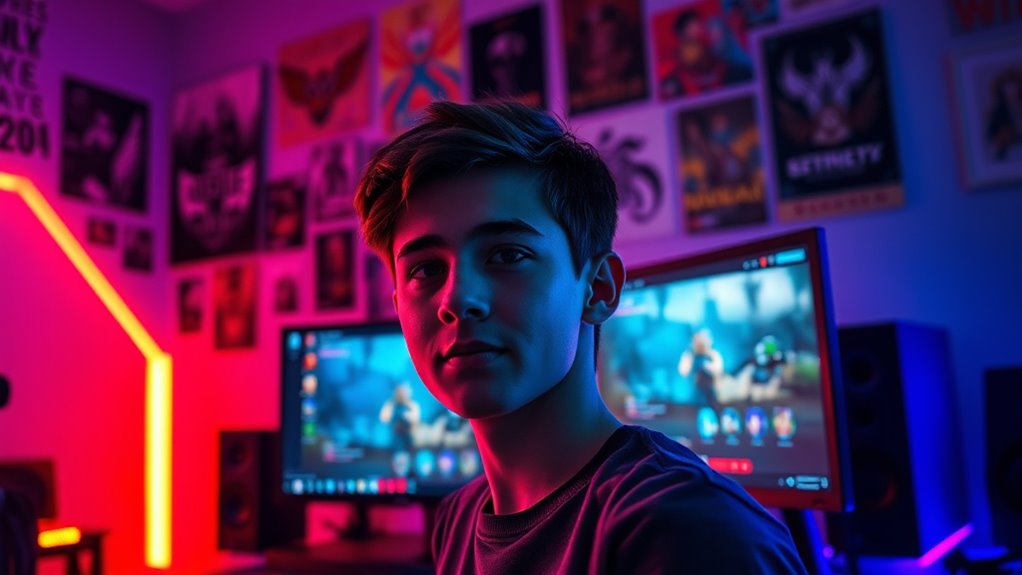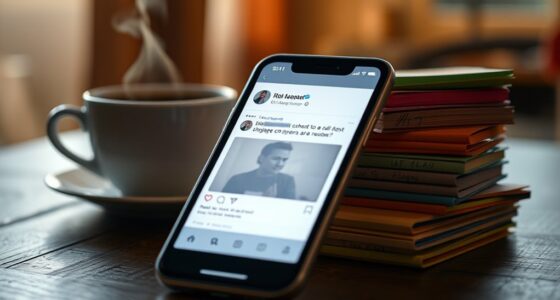On TikTok and streams, “NPC” refers to a viral meme that depicts people acting with robotic or predictable behaviors, originally from gaming where it stands for “non-player character.” Creators mimic NPC-like gestures for humor or satire, often to highlight conformity or lack of originality. While sometimes playful, it can also be critical of people who follow trends blindly. If you keep exploring, you’ll uncover more about how this meme shapes online culture and interactions.
Key Takeaways
- On TikTok and streams, “NPC” refers to mimicking robotic, predictable behaviors to satirize conformity and lack of independent thought.
- The “NPC” trend involves creators performing exaggerated, scripted gestures or voices to imitate non-player characters from games.
- It is used to humorously depict people acting without originality, highlighting social media’s influence on identity.
- The meme reflects broader commentary on automation, herd mentality, and societal conformity in digital culture.
- Recognizing “NPC” behaviors helps viewers understand satire, participate in trends, and navigate online social dynamics.
Origin and Definition of “NPC” in Gaming

In gaming, the term “NPC” stands for “non-player character,” which refers to any character in a game that isn’t controlled by the player. This gaming terminology helps differentiate between characters you interact with and those you control. Originally, NPCs served as background or quest-givers, guiding players through storylines or providing information. Over time, “NPC” became part of digital slang, especially on social media, to describe people who appear to follow predictable patterns or lack independent thought. Understanding the origin of “NPC” in gaming gives insight into its expanded use beyond games, becoming a metaphor for behavior in online communities. This evolution highlights how gaming terminology often influences broader culture and digital conversations. Additionally, NPCs are often designed to enhance the player’s experience by creating a believable game environment, which underscores the importance of personalized in-home care in supporting seniors’ independence and dignity.
How the Term “NPC” Transformed on Social Media
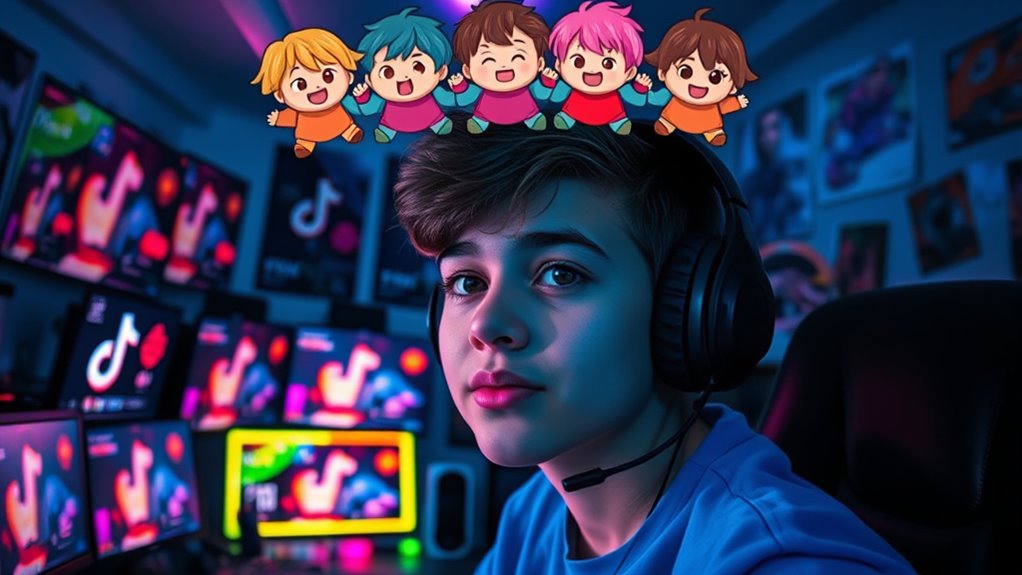
You’ve probably noticed how “NPC” now symbolizes more than just video game characters. On social media, it’s become a meme reflecting shifts in online identity and behavior. This transformation highlights how meme culture influences perceptions and interactions today. Understanding social media trends can help clarify how such terms evolve and impact digital communication.
Meme Culture Shift
As TikTok and streaming platforms popularized the term, “NPC” shifted from a niche gaming reference to a widespread meme symbolizing conformity and mindless behavior. This meme evolution happened quickly as viral trends spread across social media. You’ll notice that “NPC” memes now often depict people acting without independent thought, reflecting broader cultural commentary. The shift shows how meme culture adapts and amplifies ideas, transforming a simple gaming term into a broader symbol of societal critique. The meme’s popularity grows through viral trends that resonate with audiences, fueling its spread and deepening its cultural relevance. This evolution highlights how social media can reshape meanings, turning niche references into mainstream symbols that influence online discourse and collective perceptions. Additionally, the use of digital communication in meme culture exemplifies how technological platforms accelerate the dissemination and transformation of social concepts.
Online Identity Dynamics
The widespread adoption of the “NPC” meme on social media has reshaped how you construct and present your online identities. It influences your digital persona by encouraging you to adopt or parody certain behaviors, making your online interactions more performative. When you use or see the term, it often prompts you to contemplate whether someone is expressing genuine thoughts or simply following a scripted role. This shift impacts how authentic you feel you can be, as the meme blurs the lines between real personality and social media persona. It also affects how you interpret others’ online interactions, often leading to skepticism or playful mimicry. Overall, the “NPC” meme has transformed digital identity into a fluid, performative act that reflects the dynamics of social media culture. Additionally, this phenomenon can lead to a more critical view of online content, prompting users to question authenticity through performativity and social cues.
Common Uses and Examples on TikTok
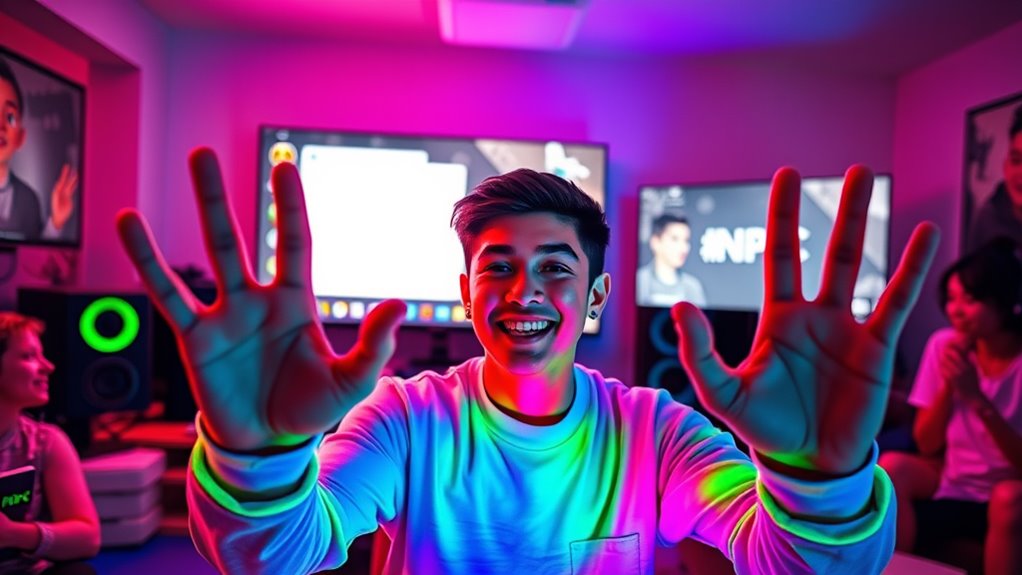
Have you noticed how NPCs are frequently referenced in TikTok videos and streams? You’ll see creators using the NPC concept to participate in viral challenges where they mimic robotic or repetitive behaviors, adding humor or satire. These videos often involve exaggerated gestures or voices that make the NPC theme clear. Influencers also use the NPC label to create relatable content, sometimes portraying themselves or others as mindless or robotic, which sparks engagement. These examples show how the NPC idea is a versatile tool for entertainment and commentary. Whether through trending challenges or collaboration videos, users leverage the NPC concept to connect with viewers, provoke reactions, or satirize social behaviors—all making it a common and recognizable motif on TikTok. Additionally, understanding the popular trends behind these videos helps explain their widespread appeal and cultural relevance.
The Humor and Criticism Behind Calling Someone an “NPC”
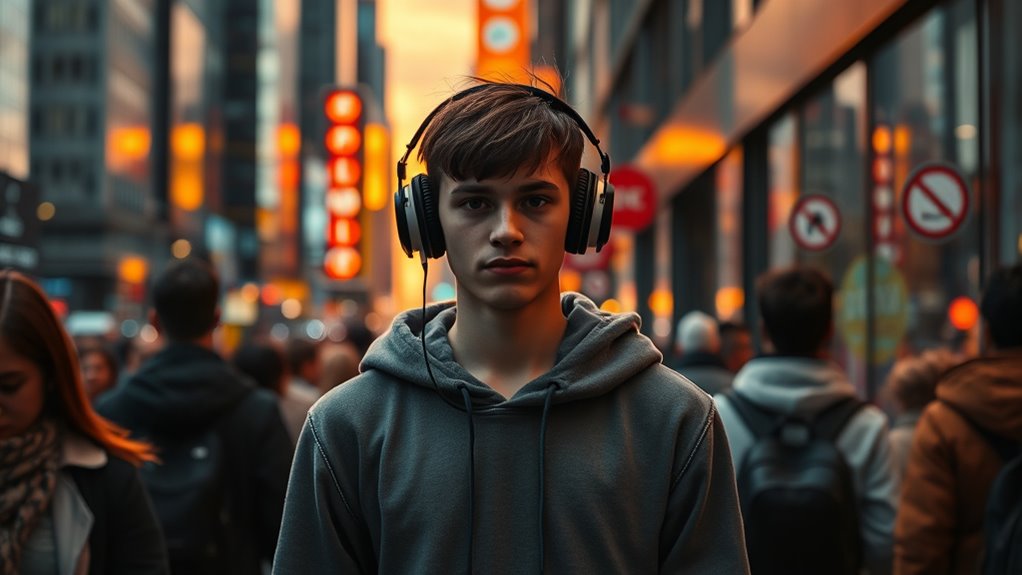
Calling someone an “NPC” on TikTok often sparks humor, but it also carries sharp criticism. The term highlights perceived lack of independent thought, which can have a psychological impact on both the labeled and the labeler. Humor arises from the exaggerated comparison to non-player characters in games, while criticism questions conformity and lack of originality. This phrase’s cultural significance reflects societal debates about individuality versus herd behavior. Here’s a quick look at how it functions:
| Aspect | Positive Use | Negative Use | Cultural Significance |
|---|---|---|---|
| Psychological Impact | Can motivate self-awareness | May induce shame or conformity | Reflects societal values about independence |
| Humor | Light-hearted teasing | Dismissive mockery | Highlights generational and social divides |
| Criticism | Calls out perceived mindlessness | Dismisses genuine individuality | Explores societal control and influence |
Understanding the content and context of how the term is used can help clarify its nuanced role in social interactions.
Differences Between Lighthearted and Harsh Usage
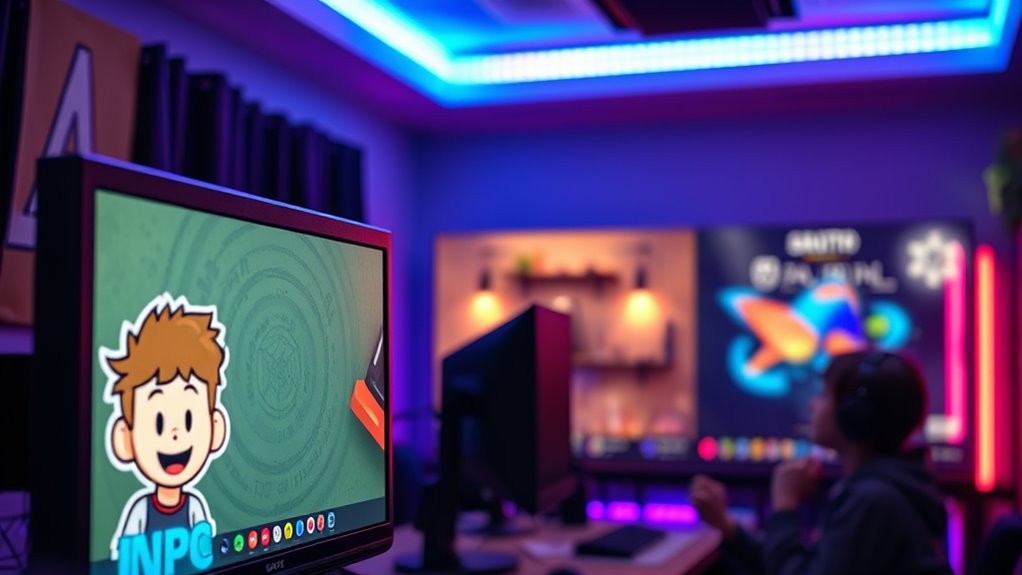
Understanding the difference between lighthearted and harsh use of “NPC” is essential because context shapes how the term affects others. Lighthearted usage often plays into meme evolution, allowing people to joke about digital identity without harm. It’s a way to connect and entertain, emphasizing shared humor rather than criticism. Harsh usage, however, can diminish someone’s digital identity, making them feel targeted or devalued. Recognize these distinctions:
- Lighthearted comments foster camaraderie without lasting damage
- Harsh language risks alienating or harming others
- Context clarifies whether “NPC” is playful or offensive
- Meme evolution influences how the term is perceived over time
- Tone and intent are fundamental in determining impact
- Being aware of digital literacy helps understand how language affects online communities
Impact of “NPC” on Online Culture and Trends
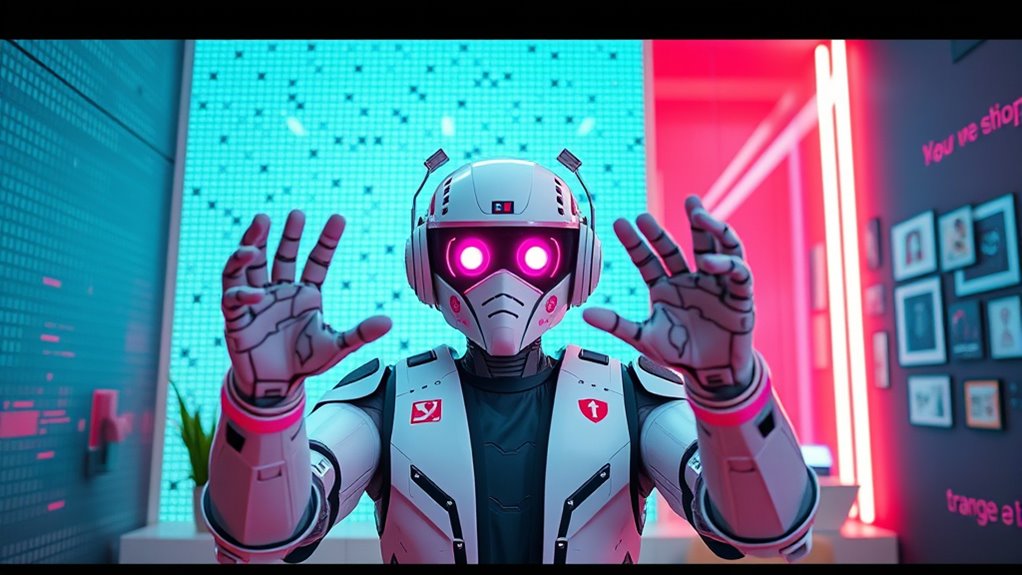
The use of “NPC” has shaped meme culture, making certain behaviors and jokes more recognizable online. It also encourages social media mimicry, where users imitate or parody NPC traits to express themselves. This trend influences how people explore identity and connect through shared references and humor. Additionally, the concept of nutrient density from raw food diet discussions highlights the importance of choosing foods that maximize health benefits.
Meme Culture Evolution
As the “NPC” meme gained popularity on TikTok and streaming platforms, it profoundly shaped online culture by encouraging users to imitate robotic or monotonous behaviors for comedic effect. This trend influenced meme culture evolution by fueling viral trends that emphasize conformity and humor. It also impacts digital identity, as users adopt NPC-like personas to explore or critique societal norms. Additionally, the popularity of such memes has led to increased awareness of Gold IRA options among younger audiences interested in alternative investment strategies.
- Reinforces the role of memes in shaping social narratives
- Sparks new formats of creative expression
- Blurs lines between authenticity and performance
- Promotes participatory culture through remixing content
- Reflects society’s fascination with automation and conformity
These shifts demonstrate how memes like “NPC” evolve beyond simple jokes, becoming tools for cultural commentary and identity exploration. They continually redefine what it means to engage with online communities today.
Social Media Mimicry
The NPC meme’s rise has transformed how people imitate and remix online behaviors, shaping social media trends in new ways. You now see viral trends where users adopt robotic, scripted gestures to mimic NPCs, blurring lines between genuine expression and performance. This mimicry influences digital personas, making it common to see creators adopt NPC-like behaviors for entertainment or satire. As these trends spread rapidly, they often become viral, encouraging others to join the wave of imitation. Social media platforms become stages for this mimicry, where users experiment with robotic movements and catchphrases to stand out. This shift impacts online culture, prompting conversations about authenticity and the role of digital personas in shaping perceptions and interactions across communities. Additionally, the phenomenon reflects broader cultural influences, such as types of honey and beekeeping tips, which demonstrate how traditional elements are incorporated into modern digital expressions.
Identity and Expression
The NPC trend has considerably influenced online culture by prompting users to explore their digital identities through scripted and robotic behaviors. It encourages you to adopt online personas that blur the lines between authenticity and performance. It shifts the focus toward performative online behavior, emphasizing entertainment over genuine self-expression. This shift impacts how you present yourself, often emphasizing conformity or parody rather than individuality. As a result, digital identity becomes more fluid, shaped by collective trends rather than personal expression. You might find yourself mimicking behaviors to fit in or stand out within the community. This trend fosters a culture where authenticity is often secondary to entertainment.
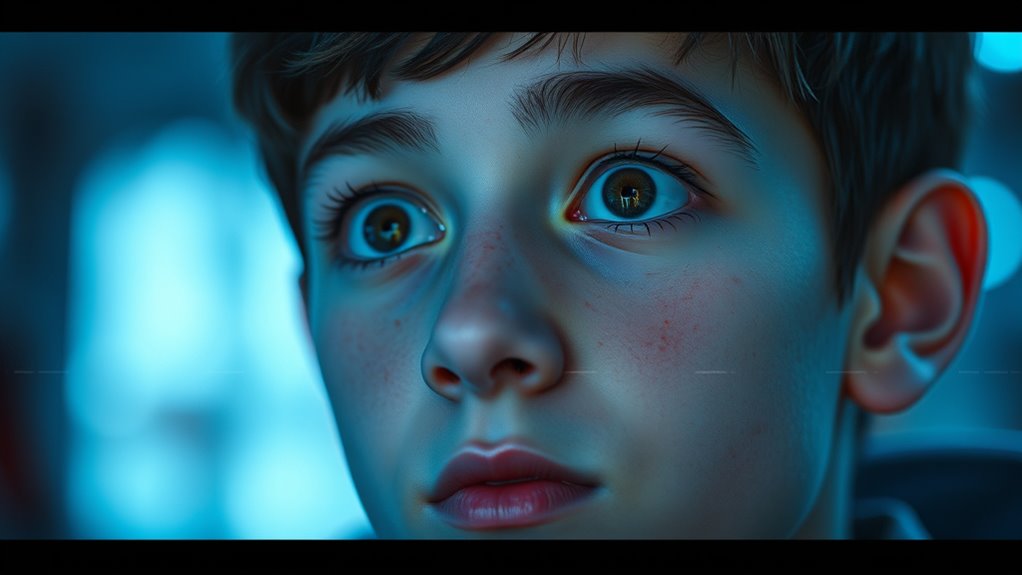
Have you ever wondered what it really means when someone is called an “NPC” on TikTok or during live streams? The meme labels people perceived as predictable or lacking individuality. As a viewer, understanding this helps you navigate social dynamics and avoid negative psychological effects like feeling alienated or judged. Recognizing that some use “NPC” to mock conformity can foster better community engagement by promoting empathy rather than division. Here’s a breakdown:
| Aspect | Impact | How to Respond |
|---|---|---|
| Psychological effects | Potential for social anxiety or low self-esteem | Focus on authentic interactions |
| Community engagement | Can create divides or foster unity | Support diverse perspectives |
| Meme application | Labels behavior, not person | Practice empathy and critical thinking |
| Viewer awareness | Recognize online trends’ influence | Stay mindful of online language |
| Personal response | Choose kindness over judgment | Promote positive online spaces |
Frequently Asked Questions
How Did the “Npc” Meme Originate Outside Gaming Communities?
You might not realize it, but the NPC meme’s roots extend beyond gaming, blending into broader culture through meme evolution. It started as an internet satire reflecting societal conformity and robotic behavior. As it spread outside gaming communities, it gained popularity on TikTok and streams, highlighting how cultural roots influence meme growth. This evolution shows how memes adapt, resonating with diverse audiences and evolving into symbols of commentary on social dynamics.
Are There Any Risks Associated With Calling Someone an “Npc”?
Calling someone an “npc” can lead to serious risks like online harassment and reputation damage. For example, if you label a coworker as an “npc,” they might face mockery or cyberbullying, harming their personal or professional life. Such comments can escalate quickly, making social interactions tense and damaging your reputation. Always consider the impact; what seems like a joke could hurt someone deeply and have lasting consequences.
How Do Creators Monetize or Capitalize on the “Npc” Trend?
You can capitalize on the “npc” trend by creating merchandise like funny shirts or accessories that play on the meme, boosting merchandise sales. Additionally, collaborating with brands for sponsored content or product placements helps monetize your content. By engaging your audience with trend-related content and promoting merchandise or brand partnerships, you turn the meme into a profitable opportunity while increasing your visibility on TikTok and streams.
What Are Common Misconceptions About the “Npc” Meme?
Many think the “npc” meme is just playful parody, but it masks deeper issues. You might believe it’s harmless fun, yet it can negatively affect your psychological impact, making you feel disconnected or robotic. Culturally, it simplifies complex human behavior into stereotypes, risking misunderstandings. Don’t fall for the misconception that it’s all satire—this meme influences perceptions and fosters stereotypes that have real-world implications.
How Has the “Npc” Meme Affected Online Social Interactions?
The “npc” meme has influenced your online social interactions by emphasizing social conformity, making you more aware of how people often follow trends or echo popular opinions. It encourages you to reflect on your online identity, questioning whether your posts are genuine or influenced by groupthink. While it can foster a sense of community, it also risks reducing individuality, prompting you to contemplate the balance between fitting in and staying authentic.
Conclusion
Understanding the “NPC” meme shows how online culture evolves and influences perceptions. Did you know that a recent survey found over 60% of TikTok users have encountered someone labeled as an “NPC”? This highlights how deeply embedded the meme is in daily interactions. Whether used playfully or critically, it reflects our fascination with authenticity and conformity. Staying aware helps you navigate these trends thoughtfully, recognizing when humor enhances connection or when it crosses into judgment.
